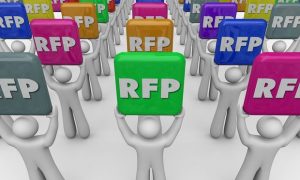Strategic Sourcing Technology for Legal Service Procurement
 By Beau Wysong, originally published on Law.com
By Beau Wysong, originally published on Law.com
By using RFPs, companies can engage with law firms outside of their existing network to find the best possible combination of experience, services and pricing.
It’s no secret that corporate legal teams are under tremendous pressure to manage spend and operate more efficiently. These imperatives have led to a renewed focus on how legal service providers are selected—which brings us to the rise of the legal request for proposal (RFP).
For several years now, more and more corporate legal teams have been embracing the RFP process as a way to be more methodical and deliberate. A Legaltech News article points out that by using RFPs, companies can engage with law firms outside of their existing network to find the best possible combination of experience, services and pricing.
However, along with the change comes a challenge: The traditional RFP process is complex and time-consuming. From creating and issuing a detailed RFP to collecting and evaluating proposals, RFPs are still largely manual, and therefore, somewhat tedious. Luckily, RFP technology has emerged and is poised to transform legal procurement for corporate legal teams.
Why Legal Procurement and RFP Technology Are a Perfect Match
RFPs empower corporate legal teams with a strategic, data-driven way to find the right law firm partner. However, issuing and administering the RFP then evaluating the results manually is a challenge. Similarly, law firms struggle to collaborate effectively, customize proposal content and meet RFP deadlines.
Full-circle RFP management software enables both corporate legal teams and law firms to work more effectively by centralizing and automating the process from beginning to end. Because it improves the entire RFP lifecycle, everyone benefits from more effective RFPs, clearer communication and faster outcomes. For corporate legal teams, RFP software enables users to collaborate on RFP requirements, create and store templates, centralize vendor profiles and communications and automate the law firm evaluation process.
In a recent webinar , Matthew Prinn of RFP Advisory Group addressed the shift toward technology saying, “RFPs used to be very old-fashioned, but now there’s a handful of products on the market that allow general counsel and legal operations folks to issue RFPs much quicker, grade them much easier and have their entire legal team collaborate on grading the response in a much more efficient process.”
Three Ways RFP Software Makes Legal Service Procurement Easier
Create RFPs faster with profiles and dynamic templates
Effective RFPs need to ask the right people the right questions. But, deciding which law firm is best suited to a matter can require a lot of research. However, RFP software allows corporate legal teams to create a catalog of law firm profiles. These profiles are living documents that are used to gather their background, qualifications and billing structure. Then, a simple search filters the firm profiles and narrows the list of RFP recipients to only the most qualified outside counsel candidates.
When it comes to creating an effective RFP, it has to ask the right questions. With RFP software, dynamic RFx templates are easy to create. Questions can be saved and grouped into sections to make building any questionnaire fast and easy. In a matter of minutes, an RFP can be created that asks all the required questions about the firm’s background, expertise, billing structure, delivery approach and more.
Centralized RFP issuing, administration and law firm communication
When the RFP is ready and the right firms are selected, it can be issued with instructions included and attachments shared with the click of a button. Before, corporate legal teams often had to wait weeks to find out which firms were going to submit proposals. With real-time progress reporting in RFP software, there’s no mystery about who is working on the RFP.
In addition, RFP software centralizes communication with firms so all questions about the project can be tracked and managed in one place. In-house legal teams can share updates, provide clarification, extend a deadline and more within the tool—saving inboxes from overflowing.
Side-by-side, data-driven law firm evaluation and selection
Once the legal procurement team has received all of the responses, evaluating them can get messy. Nancey Watson, a legal RFP consultant, discussed the challenge in an interview saying that in-house departments struggle to work through and score complex proposals. She goes on to mention a company that took a staggering (and costly) 18 months to work through their law firm selection process.
RFP technology truly transforms the evaluation process. Within the platform, corporate legal teams can establish criteria and weights to automate proposal scoring. They can also assign questions and sections to the most knowledgeable stakeholders for scoring input. Once scored, evaluation is made even easier with side-by-side comparisons and visual reports of the results.
In addition, reports with historical data and previous responses can quickly be created to see how a firm’s proposals and pricing have changed over time.
Technology to Improve the Future of Legal Sourcing
RFPs empower corporate legal teams to find the best firm at the best value. At the same time, RFP technology makes issuing complete, effective RFPs easier and faster. As time goes on, it’s no surprise that corporate legal teams are adopting new RFP technology that is delivering value to their business as well as benefits to the law firms that serve them.
Beau Wysong is chief marketing officer at RFP360 . He leverages his extensive background in technology marketing and sales to drive business growth for the software company. Beau is responsible for building a market-leading brand, engaging customers and educating future customers with knowledge.
